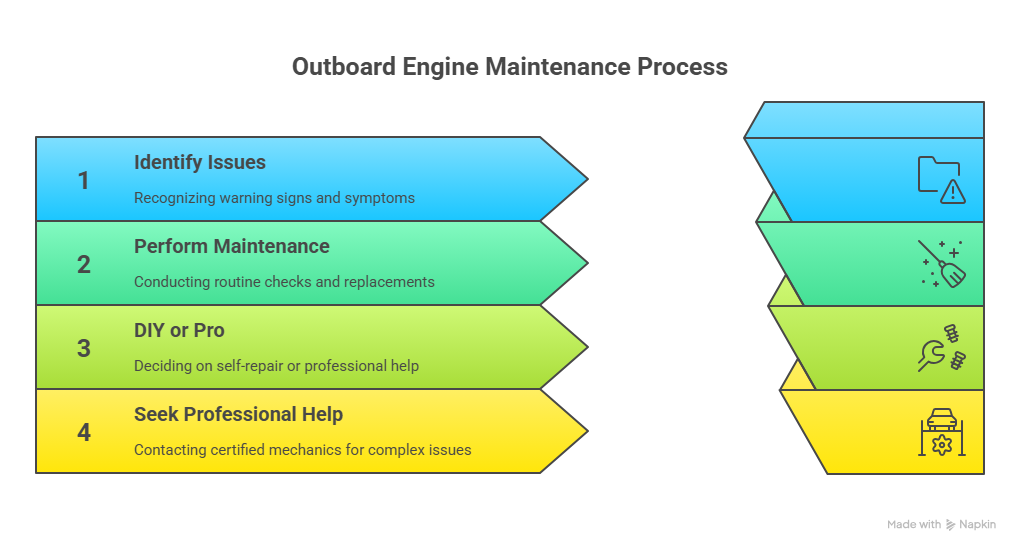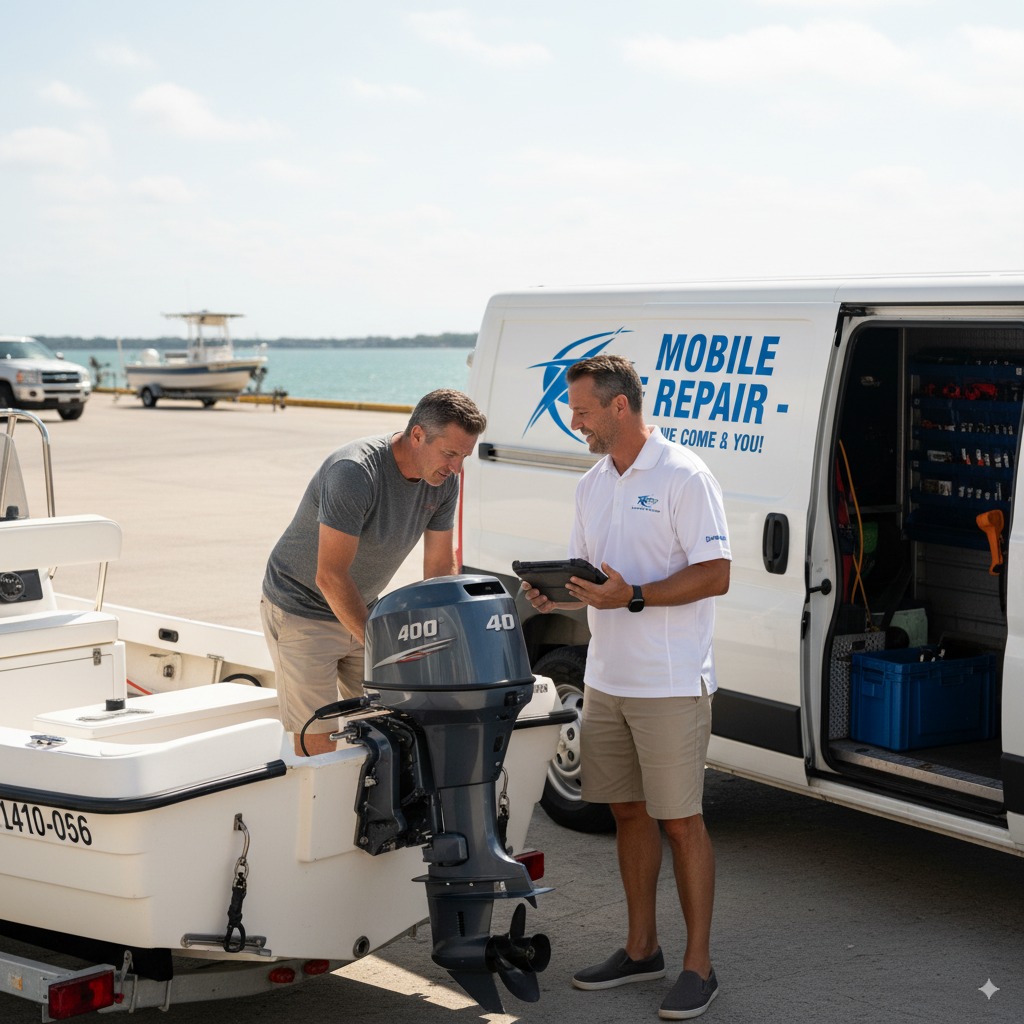I’ve spent fifteen years with my hands covered in grease, fixing outboards here in South Florida. And let me tell you, there’s nothing that ruins a perfect day on the water faster than an engine that won’t cooperate.
Just last month, a guy named Mike called me in a panic. He was stuck at the boat ramp, his family waiting, and his little 15-horse outboard refused to start. He was frantically searching on his phone for “small marine engine repair near me,” thinking his weekend was shot and he was looking at a huge bill. I walked him through a few things over the phone. Turns out, the kill switch wasn’t properly clipped in. A simple, five-second fix. He was embarrassed but relieved.
That’s the thing about these motors. Sometimes the fix is easy, and sometimes it’s a sign of something bigger. The trick is knowing the difference. This guide isn’t here to make you a master mechanic. It’s here to make you a smarter boat owner, so you know what to look for, what you can handle yourself, and when it’s time to find a good small marine engine repair near me shop.
Table of Contents
What’s Actually Inside That Engine?
Before you can fix anything, you need a basic idea of what you’re looking at. Don’t worry, we won’t get too technical. Think of your outboard as having a few main teams working together:
- The Powerhead: This is the heart and brains. It’s where the fuel ignites and the power is made.
- The Fuel System: This is the engine’s digestive tract. It gets fuel from the tank, filters it, and feeds it to the powerhead. 90% of the problems I see start here.
- The Cooling System: This is the engine’s air conditioning. It pumps raw water through the engine to keep it from melting down. It’s absolutely critical.
- The Lower Unit: This is the part in the water. It’s a gearbox that takes the engine’s power and spins the propeller.
A few key players you should know by name are the spark plugs (they make the spark), the fuel filter (keeps dirt out of the engine), and the impeller (a little rubber star that runs the cooling system). Knowing just this much puts you ahead of most boaters and makes talking to a small marine engine repair near me service much easier.
When Your Engine Tries to Talk to You
Your engine will usually give you warning signs before it completely gives up. Learning to listen is key.
- It Won’t Start: This is the most common complaint. Before you panic, check the easy stuff: Is the kill switch on? Is the battery connected and charged? Is there fuel in the tank? Simple, I know, but you’d be surprised how often it’s one of these. If not, it could be bad fuel or fouled spark plugs.
- It Sputters or Loses Power: This almost always screams “fuel issue.” It’s likely a clogged fuel filter or water in your fuel. This is the first thing any tech at a small marine engine repair near me shop will check.
- It’s Overheating: If you see steam or an alarm goes off, shut the engine down immediately. The most likely culprit is a worn-out impeller or a clogged water intake. Look at the back of the engine. There should be a steady stream of water peeing out. If you don’t see that “tell-tale” stream, you have a cooling problem. Don’t run it again until it’s fixed.

The Best Repair is the One You Never Have to Make
I make my living fixing broken engines, but I’d rather see people enjoy their time on the water. The secret? Proactive maintenance. It’s not glamorous, but it’s the best way to avoid seeing the inside of a small marine engine repair near me facility.
Here’s your checklist:
- Fuel: Use fresh, stabilized fuel. If your boat sits for a while, that fuel goes bad. Change the fuel filter at least once a season.
- Spark Plugs: Check and replace them. It’s cheap and easy.
- Gear Lube: Change the lower unit oil once a year. If it comes out looking milky like coffee, you have a water leak that needs to be fixed ASAP.
- Impeller: This is a wear item. It should be replaced every year or two, whether it looks bad or not. A failed impeller will cook your engine.
DIY vs. Calling the Pros
I’m all for owners getting their hands dirty. But it’s also crucial to know your limits. Here’s a table that breaks down what you can likely handle versus when it’s time to find a professional for small marine engine repair near me.
| Task | DIY-Friendly? | My Advice |
|---|---|---|
| Changing Spark Plugs | Yes | Easy. A great first job. |
| Replacing Fuel Filter | Yes | Usually very simple. |
| Changing Gear Lube | Yes | Straightforward, just be careful not to strip the screws. |
| Replacing Impeller | Maybe | A bit more involved, but doable with a service manual. |
| Carburetor Rebuild | For the brave | Requires patience and organization. Easy to mess up. |
| Electrical Issues | No | This is where you call for small marine engine repair near me. |
| Internal Engine Work | Absolutely Not | Leave this to the certified professionals. |
When you do need a pro, don’t just pick the first name that pops up. Ask for recommendations. Look for a mechanic with certifications for your engine brand. Good communication and transparent pricing are signs of a trustworthy shop for small marine engine repair near me.
FAQ: Questions I Always Get at the Ramp
How do I find a good mechanic for small marine engine repair near me?
Start by asking other boaters at your local marina or ramp. Word of mouth is huge in this business. Then, check online reviews and look for shops that have been around for a while.
Why does my engine always have fuel problems?
Modern fuel, especially with ethanol, is terrible for marine engines. It absorbs water and deteriorates quickly. The best things you can do are use a fuel stabilizer every time you fill up and change your fuel/water separator filter often.
What are the most important spares to keep on my boat?
At a minimum: a spare set of spark plugs, a spare fuel filter, and a propeller shear pin if your motor uses one. These can save your day.
How much should I budget for annual service?
For a small outboard, a professional annual service will likely run you between $200 and $400. It’s the best money you can spend on your boat all year. It will save you a lot more than that in avoided repairs, and it’s much cheaper than an emergency call to a small marine engine repair near me service.
Is it worth fixing an old outboard?
It depends. Many older 2-stroke engines are simple, reliable, and easy to fix. If the engine has good compression and isn’t a rust bucket, it’s often worth repairing. A good mechanic can help you make that call.
The Bottom Line
Understanding your outboard is about empowerment. It’s about having the confidence to head out on the water, knowing you can handle the small stuff and have a plan for the big stuff.
Here’s what I want you to take away:
- Learn the Basics: Know the main parts of your engine and what they do.
- Do Your Maintenance: An ounce of prevention is worth a pound of cure, especially with boats.
- Listen to Your Engine: It will tell you when it’s sick.
- Know When to DIY and When to Call for Help: Don’t be afraid to tackle simple jobs, but also don’t be too proud to call a pro when you’re in over your head. Finding a great service for small marine engine repair near me is a key part of boat ownership.
Start with the simple things. Get a copy of the service manual for your engine. Before your next trip, check your fuel filter and your propeller. The more you know about your engine, the more you’ll enjoy your time on the water.
Author Bio
I’m Alex, a 15-year marine technician in South Florida, ABYC-certified. I specialize in small marine engine repair near me, having fixed everything from portable 2-HP kickers to classic 50-HP outboards. I run a mobile service, helping boaters at marinas like Dinner Key and local ramps get back on the water fast.


Leave a Reply